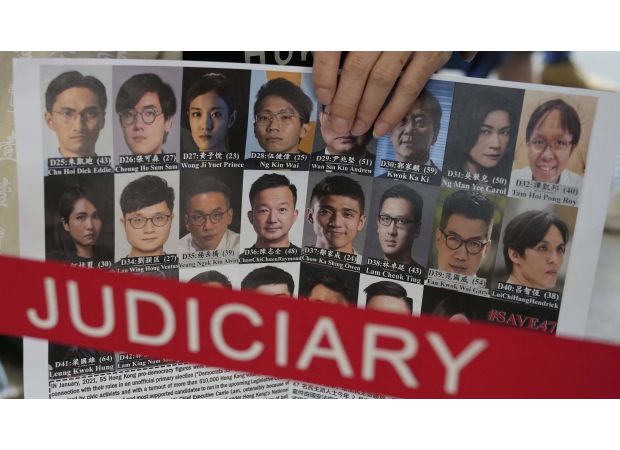Many people given up to 10 years in jail in Hong Kong for violating national security laws.
Many well-known activists in Hong Kong were given prison sentences of up to 10 years for violating a national security law imposed by Beijing, effectively ending the pro-democracy movement.

On Tuesday, a significant event took place in Hong Kong as dozens of prominent activists were sentenced to prison. This case is the largest national security case in the city, and it is a result of Beijing's implementation of a sweeping law that has effectively silenced the once-thriving pro-democracy movement.
The 45 defendants were prosecuted in 2021 for their involvement in an unofficial primary election under the 2020 national security law. They were accused of attempting to paralyze the Hong Kong government and force the city's leader to resign. Their plan was to win a legislative majority and use it to block government budgets, which would ultimately disrupt the city's functioning.
The convicted activists received prison sentences ranging from four years and two months to 10 years. One of them, legal scholar Benny Tai, received the longest sentence. They either pleaded guilty or were found guilty of conspiracy to commit subversion by three government-approved judges. According to the judges' verdict, the activists' actions aimed at changing the government through the election would have undermined its authority and caused a constitutional crisis.
Out of the 47 original defendants, two were acquitted. This case is seen as a clear example of how the authorities have suppressed dissent following the massive anti-government protests in 2019. It also highlights the media crackdowns and limited public participation in elections. This drastic change reflects how Beijing's promise to maintain Hong Kong's civil liberties for 50 years after its return to China in 1997 is slowly fading away.
Both the Beijing and Hong Kong governments justify the national security law, stating that it is necessary for the city's stability. However, this subversion case involves pro-democracy activists from all backgrounds, including former student leaders, lawmakers, and activists like Joshua Wong and Benny Tai. Most of them have already been detained for more than three and a half years before the sentencing, causing immense pain for them and their families.
During the sentencing, some activists showed remorse and apologized, while others remained defiant. The lawyers for Tai and several other defendants argued that their clients genuinely believed their actions were lawful at the time. Despite the rain and winds, more than 200 people stood in line for a seat in the court, including one of the acquitted defendants, Lee Yue-shun. He expressed his hope that the public would pay attention to the development of the court case because their interpretation and understanding would have a significant impact on society's future.
One of the supporters, known as "Grandpa Wong," shared that he didn't know the English spelling of his name, but he wanted to see the convicted activists again. At around 100 years old, he feared that he wouldn't be able to see them when they are eventually released from prison. Another friend of a convicted activist, Wei Siu-lik, arrived at 4 am, despite having an injured leg. She wanted the activists to know that many people are still supporting them.
Out of the 45 convicted activists, 31 entered a guilty plea, which may result in reduced sentences. The national security law allows for a range of sentences, depending on the severity of the offense and the defendant's role in it. The least serious offenses can result in a prison term of under three years, while those convicted of "grave" offenses can receive sentences of up to 10 years to life.
The unofficial primary election that took place in July 2020 had drawn 610,000 voters and was intended to select pro-democracy candidates for the official election. The pro-democracy camp hoped to secure a legislative majority to pursue their demands, including greater police accountability and democratic elections for the city leader. However, the government postponed the official election due to the COVID-19 pandemic.






